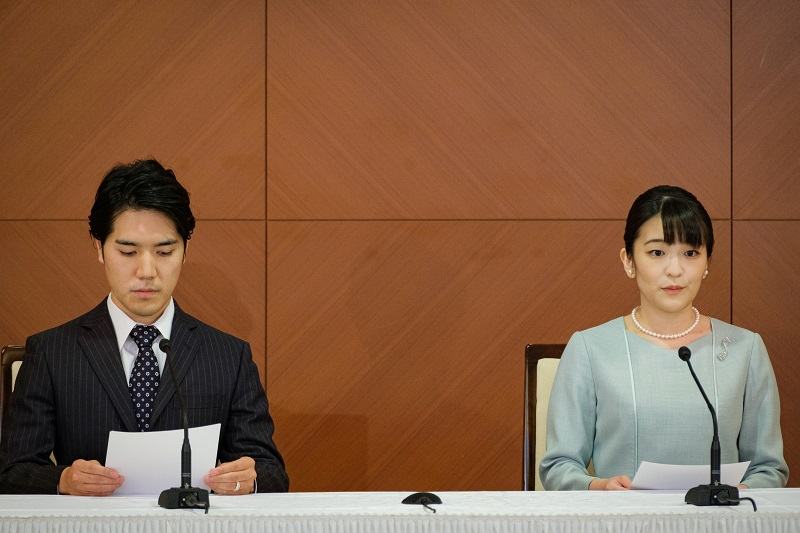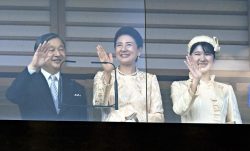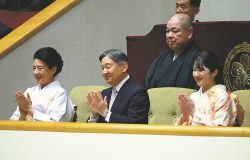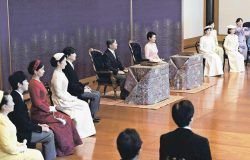
Japan’s Princess Mako and her husband Kei Komuro attend a news conference to announce their marriage registration at Grand Arc Hotel in Tokyo, Japan, October 26, 2021.
17:02 JST, October 27, 2021
Although she was setting out on a new phase of her life, former Princess Mako’s smile was subdued at the press conference she gave on Tuesday. There was no wedding ceremony for the eldest daughter of Crown Prince Akishino, no one-time marriage allowance paid by the state, and the public was not given any opportunity to celebrate her marriage.
It is necessary to reflect on how things came to this end, an unusual conclusion for the Imperial family, which has been supported by the public’s empathy.
Female members of the Imperial family lose their royal status upon marriage, and it has been the policy of Crown Prince Akishino’s family that female members’ wishes should be respected when choosing a partner. Consequently, Mako has made her own decisions in finding the person she wanted to marry.
As it was a private matter, the involvement of the Imperial Household Agency was also limited as much as possible. So much so that the then grand steward of the agency was not informed of Princess Mako’s choice of partner until just before a news report that she was to be engaged.
The announcement of her unofficial engagement was initially greeted with enthusiasm, but soon after the public was surprised by news reports about money troubles in Kei Komuro’s family.
Committed to “impartiality and neutrality,” Crown Prince Akishino and Crown Princess Kiko refrained from intervening. But Komuro and Mako’s response was unfocused. Public sentiment changed when Komuro went to the United States to study after their engagement was postponed, without providing any explanation to the public beforehand.
“Studying at an ultra-elite university in New York.” “Suspected ‘illegal stay’ in the United States.” Articles in weekly magazines bashing Komuro, topped by sensationalist headlines like these and based on dubious statements, spread via social media.
Princess Mako, who had completed official visits to far-away countries in South America, was scheduled to take a break and attend the theater in New York, a relay point on her way back to Japan from South America. Informed of the uproar in Japan, she gave up this plan.
Despite being traumatized by what has been called “slander and libel,” Mako kept silent until the announcement of their marriage on Oct. 1, believing that the freedom of the press must be respected to the greatest extent possible. Her response was worthy of a member of the Imperial family, which puts a high value on the freedom of the people and general principles. But in the face of hostile news reports that took advantage of an unexpected situation, such a response seemed ineffectual.
At the press conference on Tuesday, former Princess Mako said there had been misunderstandings that she attributed to the restrictions on her ability to speak publicly.
Only female members of the Imperial family become private citizens when they marry. To lighten the heavy pressure of making such a choice, it is also necessary to handle the situation from the viewpoint of crisis management.
The only protest lodged by the Imperial Household Agency amid the series of news reports related to the couple was in relation to a report that speculated on the feelings of the Empress Emerita. A letter of protest on this matter was even translated into English.
The Empress Emerita was attacked in magazine articles during the Heisei era. I interpreted the Empress Emerita’s response as indicating that the Imperial family should deal firmly with groundless criticism, even as she respected the stance taken by Crown Prince Akishino’s family.
How should it be ensured that Imperial family members’ weddings are welcomed amid twisted news reports and anonymous criticism on the internet? I believe it is important to learn from this bitter experience.
Top Articles in Society
-

Producer Behind Pop Group XG Arrested for Cocaine Possession
-

Man Infected with Measles Reportedly Dined at Restaurant in Tokyo Station
-

Man Infected with Measles May Have Come in Contact with Many People in Tokyo, Went to Store, Restaurant Around When Symptoms Emerged
-

Woman with Measles Visited Hospital in Tokyo Multiple Times Before Being Diagnosed with Disease
-

Australian Woman Dies After Mishap on Ski Lift in Nagano Prefecture
JN ACCESS RANKING
-

Producer Behind Pop Group XG Arrested for Cocaine Possession
-

Japan PM Takaichi’s Cabinet Resigns en Masse
-

Man Infected with Measles Reportedly Dined at Restaurant in Tokyo Station
-

Israeli Ambassador to Japan Speaks about Japan’s Role in the Reconstruction of Gaza
-

Videos Plagiarized, Reposted with False Subtitles Claiming ‘Ryukyu Belongs to China’; Anti-China False Information Also Posted in Japan
























